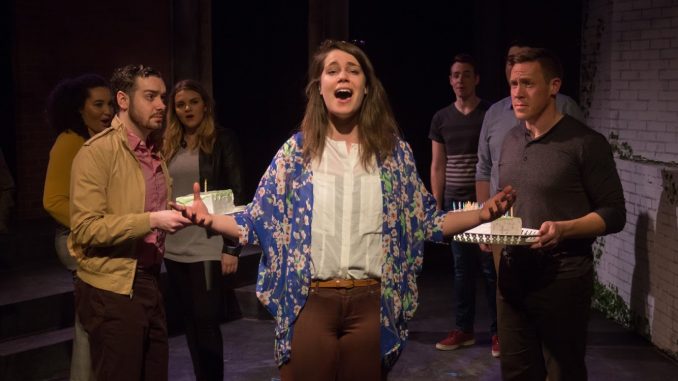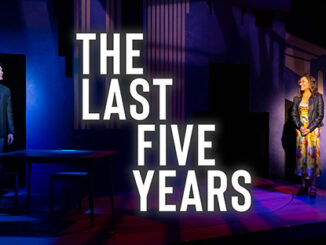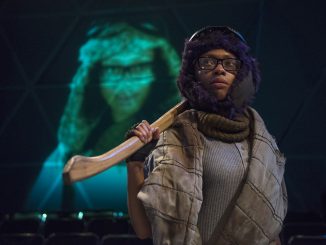
Brown Paper Box Co. is a company whose work I’ve enjoyed over the years, so it’s exciting to see them start performing in bigger spaces and tackling shows with larger casts and greater design needs. I find myself wishing, however, that they’d chosen a different show for their latest production instead of If/Then, written by Tom Kitt and Brian Yorkey of Next to Normal fame. Brown Paper Box Co. certainly works with talented people, many of whom fall outside the limited category of “traditional” musical theatre performer. But If/Then sucks. The music shoots for Sondheim-esque and lands, not so much among the stars, but more floating aimlessly in the void of space, desperately searching for something to latch onto. What really makes me want to scream, though, is the story.

In it, protagonist Elizabeth lives out the fantasy many of us have dreamed up for ourselves at some point: how would our lives be different if we had made x choice instead of y? In Elizabeth’s case, she chooses either the nickname Liz and an afternoon in the park with her new friend Kate, which leads to her meeting the love of her life Josh, or the nickname Beth and a protest with her old friend Lucas, which leads to her landing a dream job as deputy urban planner for the city of New York. The diverging nicknames and the addition and removal of two costume pieces (a cardigan and glasses) serve to indicate to the audience which timeline is currently playing out; I’d recommend against thinking too hard about the costume changes, though, as they get muddier as the show progresses and you’ll give yourself a headache wondering if Liz/Beth is supposed to be wearing that jacket right now or not.

Ultimately Elizabeth’s two universes boil down into one in which she has a great job but terrible romantic life and one in which she has a husband, kids, and a crappy job. Guess which universe she’s happier in. Okay, let me remind you that this show is written by two men, and guess again. Not only is married mother Liz significantly happier than her single counterpart, but the people around her are, too: her boss doesn’t divorce his wife because he never cheats with her; her best friend finds a boyfriend, marries him, and decides to adopt a child instead of pining after her; and she, unlike poor childless Beth, doesn’t have to deal with the nagging sense of emptiness and sorrow she feels because something is missing in her life (the something is made abundantly clear in a scene in which she babysits for her employee, her sad longing a stark contrast to the joy of Liz raising her own child).

This statement about the lives of women—that husbands and children will make us far happier than dream jobs without them—is not only reductive, it’s misogynistic. At one point, the two Elizabeths sing together about an unbearable tragedy—the sudden death of a loved one, in Liz’s case, and…not having a family in Beth’s. Sorry, but the implication that the immediate impact of grief and lingering regret over not being married with kids are somehow equivalent personal losses is so absurd it would be laughable if it weren’t so insulting to women.

There are some strong performances in this production. Amanda Giles, who is clearly in her twenties and not the nearly forty years old Elizabeth is supposed to be, has a strong and gorgeous voice that handles the relentless belting the role requires with apparent ease. Giles performs “I Hate You,” the show’s most emotionally charged number with a powerful rawness of feeling that doesn’t spill over into becoming overwrought (although the same can’t be said for the remainder of the plot). Bridget Adams-King delivers bold, energetic realness as lesbian best friend Kate, her irresistible energy and powerful voice making all her moments onstage, even the nightmarishly unrealistic scene where she’s teaching kindergarten, fun to watch. And Parker Guidry is compelling as the sometimes sweet, sometimes troubled Lucas. Michael Peter, who plays primary love interest Josh, has the charm needed for the role but not the vocal range, which is unfortunate and means that Giles has to carry their duets.

Set design by Jeremy Hollis manages to create a lot of locations with limited space and limited set changes, although the constant addition and removal of a bed (which always seemed to come onstage in time for the worst scenes) grows tiresome quickly. The ensemble, though diverse and talented, doesn’t quite gel and could have used two or three more people to round it out and prevent the over-double casting that often drives me crazy in small shows. The choreography tries hard to achieve a traditional musical theatre aesthetic in a show and space that don’t call for it; the best movement moment in the show is when the cast does a Soul Train-style dance line, complete with corny dance moves, to represent a wedding reception.

I do not like this musical. In the five years since it was written, it has managed to not age well, with a recurring joke about political views falling flat every single time it’s delivered. I do not like Kitt and Yorkey’s musical style, I can safely conclude after hearing this and Next to Normal, and I really don’t care for a great premise that turns out to be a vehicle for outdated gender politics. I hope the next show I see by Brown Paper Box Co. brings me some of the joy that If/Then failed to.
Ticket Information
Location:The Athenaeum, Studio Three, 2936 N.Southport Ave. Chicago, IL 60657
Dates: Thursday, January 23-Sunday, February 16, 2020
Tickets: Available at the Brown Paper Box website or the Athenaeum box office, 773-935-6860.
All photos by Zach Dries.




Be the first to comment